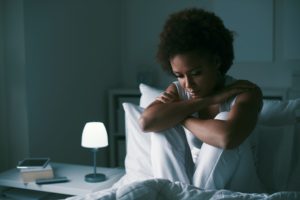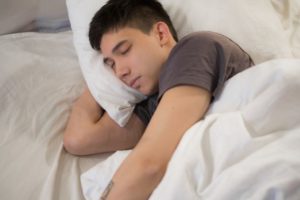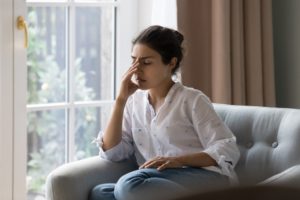Hypersomnia: Symptoms, Causes, and Treatments
How it's defined, its causes, and the steps that can help resolve it
- Hypersomnia is characterized by excessive daytime sleepiness and oversleeping.
- People with hypersomnia often struggle to stay awake during the day, which can significantly impact daily life and overall well-being.
- Causes can vary, but may include underlying medical conditions, medication side effects, or a sleep disorder.
- Recognizing the signs and seeking diagnosis is crucial for managing hypersomnia effectively.
Excessive sleepiness, also called hypersomnolence, is a common experience for those that are chronically sleep deprived. Most cases of excessive sleepiness are related to insufficient or interrupted sleep, but some people’s extreme tiredness cannot be relieved even after quality rest. While not a disorder in itself, persistent hypersomnolence could be a sign of a sleep disorder, including insomnia, obstructive sleep apnea (OSA), or hypersomnia. Hypersomnia and its related symptoms can impede on quality of life and lead to other health conditions.
What Is Hypersomnia?
Hypersomnia is a sleep disorder marked by frequent bouts of hypersomnolence or excessive nighttime sleep. Hypersomnolence is not considered a disorder in itself, but rather a symptom of hypersomnia . Hypersomnia is a stand-alone sleep disorder and cannot be caused by other conditions that result in chronic hypersomnolence, like narcolepsy.
Potential causes of hypersomnia include autonomic nervous system dysregulation, excessive alcohol or drug use, or certain medications. Some medical conditions may also play a role in the development of hypersomnia, including tumors, head injuries, multiple sclerosis, encephalitis, and epilepsy.
Hypersomnia Symptoms
People with hypersomnia often experience a strong desire to sleep at inappropriate times, like during work or school, in the middle of a social obligation, or when conversing with others. Other symptoms include:
- Frequent napping
- Irritability,
- Decreased alertness
- Heightened anxiety
- Difficulty concentrating.
A person’s professional or personal life may be negatively affected by these symptoms.

Central Disorders of Hypersomnolence
While some instances of hypersomnolence are caused by lifestyle practices or poor sleep hygiene, it may also be a warning sign of a sleep disorder. Each sleep disorder is distinct and can have varying causes, symptoms, and treatments.
Narcolepsy
Narcolepsy type 1 is a chronic neurological disorder caused by an insufficient amount of the neurotransmitter orexin. Hypersomnolence is one symptom of narcolepsy type 1, and other symptoms include cataplexy (sudden muscle weakness), sleep paralysis, and hallucinations.
Narcolepsy type 2 includes many of the same symptoms of type 1, but symptoms may be less severe. Narcolepsy type 2 does not include cataplexy and is not caused by a lack of orexin.
Kleine-Levin Syndrome
Kleine-Levin syndrome is characterized by recurring episodes of extreme hypersomnolence that occur alongside mental, behavioral, and even psychiatric disturbances. This condition predominantly affects young males, and episodes often decrease over a period of 8 to 12 years.
Hypersomnia Due to Medication or Substances
Certain sedative medications, alcohol, and narcotic drugs can cause hypersomnia. Hypersomnia can also be a symptom of withdrawal from stimulant drugs and some medications.
Hypersomnia Associated with a Psychiatric Disorder
Many mood disorders can cause hypersomnia, including depression, bipolar disorder, and seasonal affective disorder.
Insufficient Sleep Syndrome
Perhaps the most straightforward cause of hypersomnia, insufficient sleep syndrome occurs when a person persistently fails to get sufficient sleep. Poor sleep hygiene or night shift work may prevent a person from obtaining their recommended amount of sleep.
Research shows that one-third of Americans are not getting sufficient sleep on a regular basis.
Idiopathic Hypersomnia
If a patient has excessive sleepiness, without cataplexy, that is not refreshed by naps or sleep, they may be diagnosed with idiopathic hypersomnia . Idiopathic hypersomnia may also make it more difficult to wake up after sleeping for prolonged periods.
Diagnosis and Treatment
Talk to a doctor if you are experiencing hypersomnolence that interferes with your quality of life. Pinpointing the causes of your symptoms can help determine which treatments could be most effective for you. There are several tools sleep specialists may use to diagnose hypersomnia.
- Conduct a sleep study: A sleep study or polysomnography is a test conducted by sleep specialists to pinpoint signs of sleep disorders and rule out other conditions like narcolepsy or sleep apnea.
- Complete a multiple sleep latency test: Also known as a nap study, a multiple sleep latency test (MSLT) can be used to measure the level of sleepiness a person experiences throughout the day. An MSLT offers five opportunities for the patient to nap while measuring the time it takes them to fall asleep. People with hypersomnia may fall asleep quicker than those without the condition.
- Utilize the Epworth Sleepiness Scale: The Epworth Sleepiness Scale is a questionnaire used to measure a patient’s level of sleepiness. The test presents eight hypothetical situations and asks the patient to rank how likely they are to fall asleep during each on a scale of 0 (unlikely) to 3 (very likely). The patient’s responses are then tallied and used as a diagnostic tool for excessive sleepiness.
- Keep a sleep diary: Your doctor may suggest keeping a sleep diary to track the prevalence of symptoms and quality of sleep.
A prescription drug has recently been approved by the FDA to manage idiopathic hypersomnia . The medication has also been used to treat cataplexy associated with narcolepsy. Some physicians will prescribe off-label drugs to relieve symptoms of excessive sleepiness, including stimulants. Speak to your doctor about potential pharmaceutical treatments for hypersomnia and other sleep disorders.
Tips for Coping with Hypersomnia
While there is no cure for hypersomnia, there are a number of ways to manage the effects of the disorder.
- Stick to a sleep routine: Practice waking up and going to sleep at the same time each day, even on weekends. Make sure you are getting enough sleep for your age and lifestyle needs. You can calculate the amount of sleep you need using a sleep calculator.
- Curb alcohol and caffeine consumption: Alcohol and caffeine can negatively affect sleep quality. Avoid alcohol in the hours before bed, and cut off caffeine intake after 3 p.m.
- Create a peaceful sleeping environment: A cool, quiet bedroom free from blue light emitted by electronic devices can facilitate restful sleep and prevent residual drowsiness upon waking.
- Avoid dangerous activities: It is imperative to avoid driving or operating heavy machinery while tired.
Medical Disclaimer: The content on this page should not be taken as medical advice or used as a recommendation for any specific treatment or medication. Always consult your doctor before taking a new medication or changing your current treatment.

Still have questions? Ask our community!
Join our Sleep Care Community — a trusted hub of sleep health professionals, product specialists, and people just like you. Whether you need expert sleep advice for your insomnia or you’re searching for the perfect mattress, we’ve got you covered. Get personalized guidance from the experts who know sleep best.
References
6 Sources
-
National Institute of Neurological Disorders and Stroke. (July 25, 2022). Hypersomnia.
https://www.ninds.nih.gov/health-information/disorders/hypersomnia -
American Academy of Sleep Medicine. (2014). The International Classification of Sleep Disorders – Third Edition (ICSD-3). Darien, IL.
https://aasm.org/ -
National Institute of Neurological Disorders and Stroke. (2019, March 27). Kleine-Levin syndrome information page.
https://www.ninds.nih.gov/Disorders/All-Disorders/Kleine-Levin-Syndrome-Information-Page -
Sheehan, C. M., Frochen, S. E., Walsemann, K. M., & Ailshire, J. A. (2019). Are U.S. adults reporting less sleep? Findings from sleep duration trends in the National Health Interview Survey, 2004-2017. Sleep, 42(2), zsy221.
https://pubmed.ncbi.nlm.nih.gov/30452725/ -
Schwab, R. J. (2022, September). Idiopathic Hypersomnia (EDS). Merck Manual Professional Version.
https://www.merckmanuals.com/professional/neurologic-disorders/sleep-and-wakefulness-disorders/idiopathic-hypersomnia -
Trotti, L. M. (2022). Idiopathic hypersomnia: Does first to approval mean first-line treatment? The Lancet. Neurology, 21(1), 25–26.
https://pubmed.ncbi.nlm.nih.gov/34942131/





